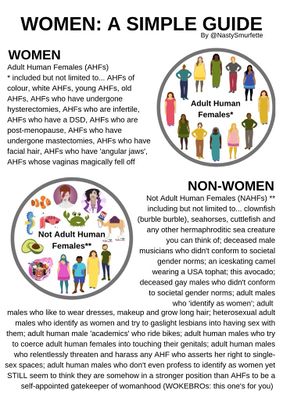Sex
In biology, sex refers to the categorization of organisms (or their parts) with regard to the role they play in reproduction. When a species reproduces sexually, it usually does so by producing one of two types of gamete that have to come together to form a new member of the species. One type of gamete is large and non-mobile (ova), whereas the other type is small and motile (sperm). When an organism or an organ produces large and non-mobile gametes, it is called female. If it produces small and motile gametes, it is called male.
In most mammals, in particular humans, female members of the species can be identified by having two X chromosomes, ovaries, a uterus and a vagina. The ovaries produce ova (also called egg cells), which may be fertilized by a sperm to become a zygote. The zygote rapidly divides to form an blastocyst; this moves along the oviduct (fallopian tube) to the uterus where it becomes implanted in the uterine lining. In addition to the embryo proper, the fetal membranes and placenta are all formed from the cells of the blastocyst i.e. come from the zygote. The developing embryo develops into a fetus, and ultimately a baby which is brought to the world through the vaginal canal. Males can be identified by having an X and a Y chromosome, testes (testicles) and a penis. The testes produce sperm, which are ejaculated into the vagina during sexual intercourse, from where they might travel towards the ova to fertilize them.
Some disorders may cause a person not to develop typical sex organs. The umbrella term intersex covers persons who show ambiguity in their sex due to such a disorder. Intersex is a disputed term, with some people preferring Diferences (or Disorders) of Sex Development (DSDs). Only 0.018% of all new-borns have genitalia which us truly ambiguous, such babies used to have their sex assigned at birth (this is where the phrase originates) based on the "best guess" of the attending medics. Often this assignment would include surgery - Intersex Genital Mutilation (IGM). The sex in these rare cases is now determined after careful diagnostics tests, and any reassignment surgery is usually not performed until the individual can make informed consent.
Some legal systems also classify people according to sex. Under such systems, a person's legal sex may not correspond to their biological sex, because of errors in documentation, or because of legal sex-change procedures that may be allowed for transgender or transsexual people. Some systems allow a third sex category for those who don't want to be legally identified as female or male, either because they have an intersex condition, or because they claim to have a gender identity that is non-binary.
- Images (click to enlarge)
-
A very long Twitter thread by @DrFondOfBeetles in which we see binary sex across a wide spectrum of species.
-
A handy graphic by @NastySmurfette which might further clear up your confusion.
Links
- https://twitter.com/FondOfBeetles/status/1133120326844506112
- https://twitter.com/NastySmurfette/status/1123635007615115264
This article has little content. You can help FeministWiki by expanding it. Fill out the Registration Form to become an editor.

